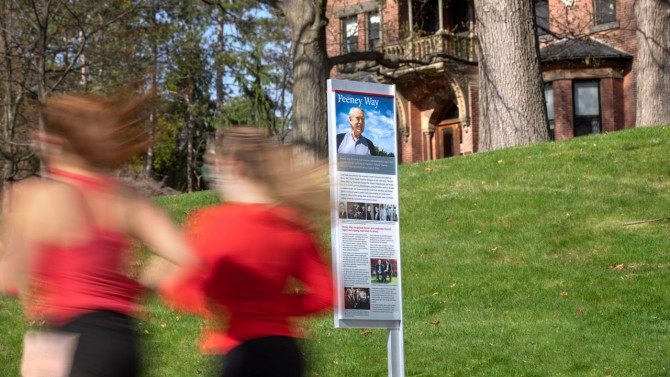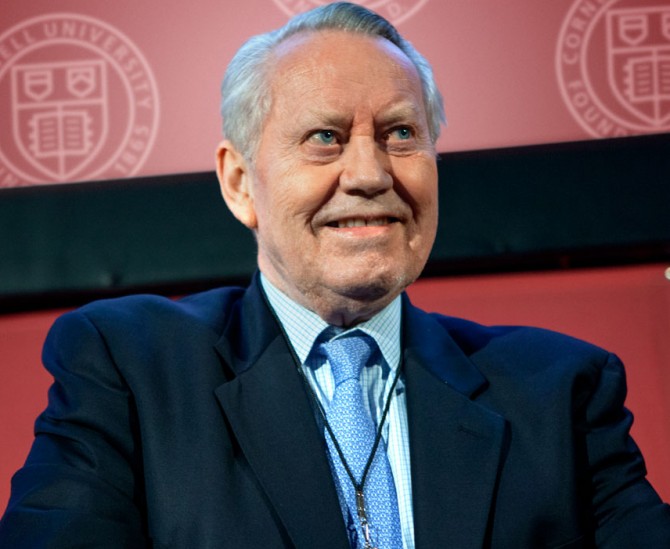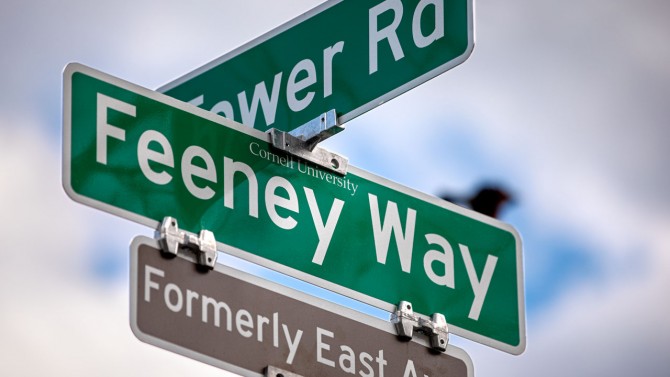‘Feeney Way’ officially unveiled on donor’s 90th birthday
By Joe Wilensky
Today, April 23, 2021, marks both the 90th birthday of Charles F. “Chuck” Feeney ’56 and the official unveiling of Feeney Way on Cornell’s Ithaca campus, honoring the man who has been called the university’s “third founder.”
Feeney, the founding chairman of The Atlantic Philanthropies and the university’s most generous donor, quietly devoted his fortune to worldwide causes for decades, and through the foundation invested nearly $1 billion in Cornell over a four-decade period.
His giving was anonymous for years and, even after the impact of his philanthropy was revealed in the late 1990s, Feeney still chose not to connect his name in any form to the many institutions he supported; consequently, until now, neither his name, nor Atlantic’s, had ever appeared on a building, program, scholarship, professorship or any other entity at Cornell.
Cornell leaders announced last December that Feeney had agreed to the planned renaming of East Avenue on campus as Feeney Way in recognition of, and gratitude for, his transformative giving across the university – though Feeney had acquiesced to the honor only because it could inspire current and future generations of Cornellians to give back to their communities and make a difference.
“We are thrilled to officially dedicate this major thoroughfare through the heart of central campus as Feeney Way, proudly recognizing the scope of Chuck’s impact across the university,” said President Martha E. Pollack. “It also emphasizes his legacy: how he has lived his life’s mission of ‘giving while living,’ and how that has inspired so many others.”
Feeney Way includes an informational sign near the corner of Feeney Way and Tower Road, across the street from Stimson Hall, with a brief bio on Feeney, describing just some of the fruits of his giving to Cornell.
A legacy of giving
Born into a working-class Irish-American family in Elizabeth, New Jersey, Feeney enrolled in the School of Hotel Administration in 1952 with support from the G.I. Bill. He was the first in his family to attend university.
At Cornell, he was already at work on entrepreneurial ventures, creating a sandwich business that was so profitable, his classmates called him “the sandwich man.” Just two years after graduation, he and Robert Miller ’55 co-founded Duty Free Shoppers, which became the world’s largest seller of luxury goods.
In 1984, Feeney secretly gave away nearly all his fortune by transferring the vast majority of his stake in Duty Free Shoppers (estimated at more than $500 million at the time) to create and establish The Atlantic Philanthropies, reducing his own wealth to less than $5 million. He quietly became one of the world’s greatest philanthropists, giving $8 billion over four decades to support people and causes around the world, from education and human rights to medical research, health equity, peacemaking and social justice.
At Cornell, Feeney’s generosity transformed the university for decades, helping to make Cornell accessible to all students, regardless of their financial means; reimagining and re-creating North and West campuses into vibrant living-learning communities; enabling multiple academic initiatives and faculty hiring across colleges and disciplines; revitalizing the sciences, humanities and social sciences; and supporting student life and athletics.
Feeney and Atlantic’s largest single investment in Cornell came in the form of a $350 million grant in 2011 – the largest-ever grant to the university and one of the largest in higher education history – to build what is today the Cornell Tech campus on Roosevelt Island in New York City.
That grant, initially made anonymously in 2011, funded much of the construction and program development for the entire first phase of the campus and was transformational for both Cornell and New York City. It also provided a permanent endowment to ensure the campus would thrive.
Feeney was one of the earliest proponents of the “giving while living” philosophy, encouraging people of means to give away the majority of their wealth to better the world during their lifetimes. When Warren Buffett and Bill Gates created the Giving Pledge initiative to motivate the world’s wealthiest individuals and families to do the same, they cited Feeney as their inspiration.
In 2020, Feeney reached his lifetime goal of giving away his entire fortune and formally dissolved The Atlantic Philanthropies.
Full circle with The Cornell Tradition
Atlantic’s very first investment in Cornell, $7 million, established The Cornell Tradition program, an undergraduate fellowship program combining work, service and scholarship opportunities to instill a strong work ethic in civic-minded students.
The program was seen as a contemporary expression of founder Ezra Cornell’s vision that all students who were willing to work hard, earn good grades and dedicate themselves to serving their communities could find a place at the university, regardless of their financial situation.
Feeney “was concerned about growing student debt and wanted to help students help themselves and others through work and service,” said Suzanne Horning, Cornell Tradition coordinator. “What is most inspiring about Cornell Tradition Fellows is that although meeting the work and service requirements keeps them busy, they enjoy being engaged in their community and helping other people versus seeing the engagement as a burden. Once they have found that enjoyment, most continue to give back once they have graduated, with service woven into their regular routines – and I think that was Mr. Feeney’s goal.”
Atlantic gave more than $40 million to The Cornell Tradition over time, supporting more than 6,000 students and, through student loan relief, enabling many of them to pursue careers in public service.
Atlantic’s final official grant as it wound down its operations in 2016 was another $7 million for the program, creating core endowments for operations and for students with financial need who wish to pursue international service experiences.
Both endowments were named for late President Emeritus Frank H.T. Rhodes to honor his long connection with The Atlantic Philanthropies, which was fostered and flourished during his presidency at Cornell and afterward, when he served on Atlantic’s board from 1995-2000 and as chairman from 2000-08.
It was Rhodes who notably referred to Feeney as Cornell’s “third founder” – behind only Ezra Cornell and the university’s first president, Andrew Dickson White, in the magnitude of their influence and impact.
Media Contact
Get Cornell news delivered right to your inbox.
Subscribe




